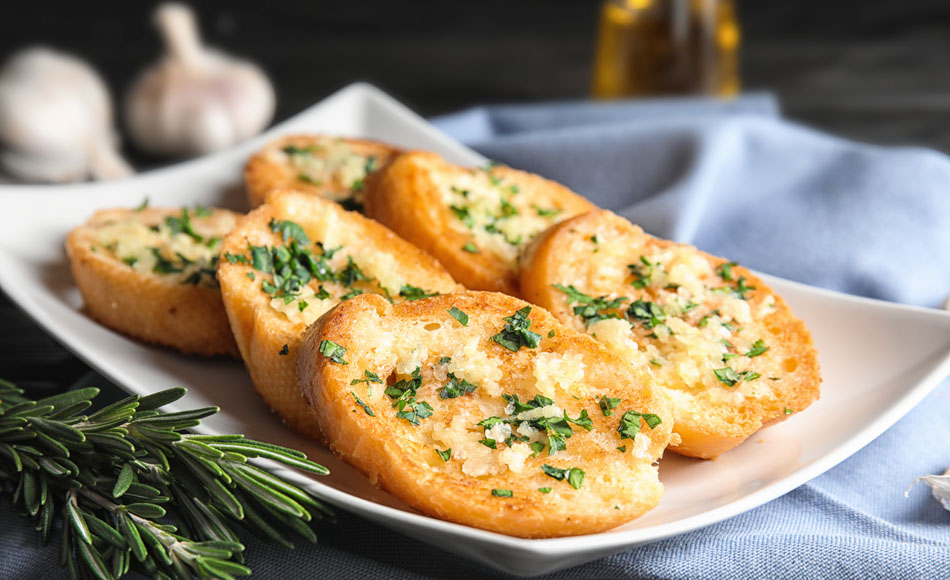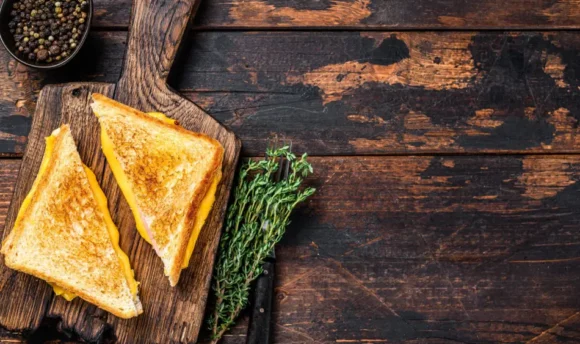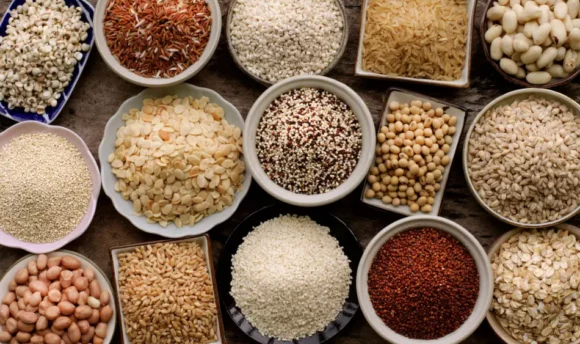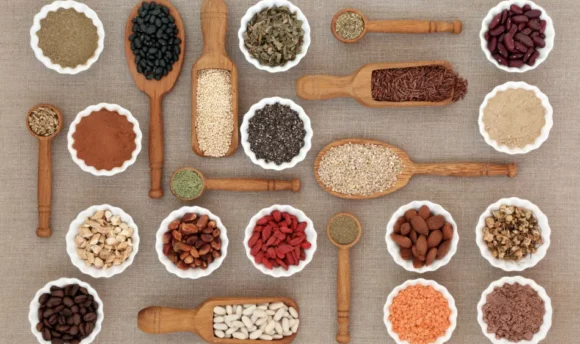Is Garlic Bread Healthy? Nutrition Facts 101
Garlic bread is a spicy and delicious snack, but if you’re following a weight loss diet, is it better to steer away completely or indulge on occasion? In this article, we take a closer look at if it’s possible to add garlic bread to your diet without remorse.

Garlic is a great addition to any kitchen as a flavor-enhancing ingredient and for its number of health benefits. However, when combined into a buttery spread on toasted bread, it does come with some drawbacks that need to be considered if on a diet or caloric deficit.
The Heath Reporter team has analyzed its nutritional profile and compiled a list of advantages and disadvantages of eating garlic bread. If you’re curious about a healthier snack option, keep reading to find a homemade garlic bread recipe.
Is Garlic Bread Healthy?
Unfortunately, garlic bread cannot be considered healthy due to its high carb and high saturated fat content.
Garlic bread is usually made with maida, a white wheat flour without fiber, though it can also be prepared with pita or sourdough. The saturated fats from butter combined with the carbs from the different bread types result in an unhealthy meal option.
However, you can prepare your own garlic bread by selecting quality ingredients such as whole-wheat bread and olive oil.
5 Health Benefits of Garlic Bread
#1 Improves gastrointestinal health
One way of improving your gastrointestinal health is to consume between 25–30g of fiber daily. Eating quality whole-wheat bread gives you 6g of fiber per serving, which, combined with garlic’s digestive benefits, improves your overall intestinal well-being.
#2 Is heart-healthy
People at risk of cardiovascular disease may benefit from eating garlic, which helps reduce cholesterol and triglyceride levels. This is true for both raw and roasted garlic.
#3 Reduces the risk of potential diseases
Garlic has many antibacterial properties, including its sulfur compounds allicin and thiosulfinates. It also contains a wide range of active ingredients that could positively impact your health, though their effectiveness is still being studied.
It is important to note that these benefits are obtained by consuming significant amounts of garlic, so if you’re snacking on garlic bread, make sure there’s a good concentration of garlic paste spread on it.
#4 Increases the number of antioxidants
Garlic contains antioxidants that support the body’s protective mechanisms against oxidation, which may help fight premature aging and cell damage that causes degenerative diseases like Alzheimer’s.
#5 Garlic can support the fight against cancer
Numerous studies have been conducted on the cancer-fighting effects of garlic. Some relevant findings link it to the reduction of cancer cells in cancer located in the digestive tract, mainly stomach, oral, larynx, esophagus and colon cancer.
These studies were conducted following the administration of raw garlic and concentrated garlic supplements for a long time. However, it is always positive to consume foods that contain multiple benefits as is the case of whole wheat bread with garlic.
3 Downsides of Garlic Bread
#1 Weight gain
Despite its great taste, garlic bread is full of saturated fats and carbohydrates. It is recommended to limit your snack calorie intake to 250kcal, and as a 100g serving of garlic bread contains 350kcal, it should be avoided on a weight loss diet or consumed in moderation.
#2 Bad breath
Hiding the fact that you have recently eaten garlic is difficult, so be sure to brush your teeth well after eating garlic bread.
#3 Garlic can cause allergies
Garlic bread can cause allergies in those sensitive to garlic and the rest of the lily family, which includes onions and leeks. If you frequently suffer from allergies after eating and have already ruled out some options such as lactose, gluten or nuts, try removing garlic from your diet to investigate if it is the culprit of your discomfort.
The symptoms you may have are typical of food allergy: rash, sneezing and even swelling of the lips. But, garlic can also cause food intolerance so you may suffer from stomach upset and heartburn.
Nutritional Facts of Garlic Bread
Nutritional value per 100g
| Calories/ Nutrients (per 100g) | Amount |
| Calories (kcal) | 350 |
| Net Carbs (g) | 39.2 |
| Fiber (g) | 2.5 |
| Sugar (g) | 3.69 |
| Fats (total) | 16.6 |
| Protein (g) | 8.36 |
| Cholesterol (mg) | 0 |
Source: https://fdc.nal.usda.gov/fdc-app.html#/food-details/167939/nutrients
High in calories
While garlic bread usually goes as a side dish with seafood or pasta, it is important to remember that a single slice of it contains 206kcal. That, in addition to the main course, may make you go over your calorie budget.
High in fats
Garlic bread contains butter, which has a lot of saturated fat. Even if substituted with olive oil or clarified butter called ghee, the fat content is still too high.
Though, it’s worth noting that both of the substitutes mentioned are much healthier options. While extra virgin oil does have saturated fat, the highest percentage of its fat is monounsaturated. Ghee is thought to be a healthier alternative to regular butter as some experts suggest its omega-3 content could provide anti-inflammatory properties. However, ghee’s effectiveness is not yet fully confirmed.
High in carbs and sugar
Bread is high in carbohydrates and, depending on the type, may contain a lot of sugar. It is important to select quality bread that is sugar-free and high in fiber to enhance the nutritional benefits of garlic bread.
Additionally, it is best to avoid frozen garlic bread products as they contain artificial garlic flavorings – by consuming them, you miss out on the benefits of eating fresh garlic.
Rich in vitamins and minerals
Garlic, whether whole or as a roasted paste, has a wide variety of vitamins and minerals, including sulfur compounds and antioxidants, which are highly beneficial for your health.
Garlic Bread vs. Alternative (Texas Toast)
| Garlic bread | Texas toast |
| Usually prepared toasting slices of French bread and baguettes | Prepared grilling a very thick slice of white bread |
| Garlic butter is spread on one side of the slice | Garlic butter is spread on both sides of the slice |
| Contains 39.2 g of carbohydrates | Contains 34.8g of carbohydrates |
| Contains 16.6g of fat | Contains 15.2g of fat |
| Has a lower amount of protein – with 8.36g per serving | Has 10.9g of protein per serving because of the added cheese |
| Prepared with fresh crushed garlic most of the time | Mostly prepared with garlic powder mixed with butter |
Healthy Garlic Bread Recipe
Ingredients
- 2 slices whole-wheat bread
- 1 tbsp clarified butter
- 2 fresh garlic cloves, minced
- A pinch of salt
- 1 small tomato, skinless, cut into cubes
- 1 tbsp fresh parsley
- 1 tbsp extra virgin olive oil
- A pinch of oregano
Directions
- Mix the minced garlic with the clarified butter and fresh parsley. Add a little sea salt and set aside.
- In a small frying pan, sauté the tomato with olive oil until reduced. Press lightly with a fork until you get a paste with chunks of tomato.
- Spread both slices of whole-wheat bread with the garlic butter and tomato, and sprinkle a little oregano on top.
- Toast your whole-wheat garlic bread and enjoy.
If you are looking for more recipes, we would recommend checking out the best nutrition apps for a healthier lifestyle!
FAQs
Yes, garlic bread contains carbohydrates and saturated fats that promote weight gain if consumed without moderation.
Classic garlic bread is not recommended when on a weight loss diet. However, you can prepare your own homemade garlic bread using whole-wheat bread and olive oil while monitoring how many slices you eat to ensure you don’t consume too many calories.
A Word From a Nutritionist
To avoid unnecessary calories when eating out, ask the waiter whether they have other options instead of garlic bread. You can opt for a salad, roasted vegetables, or even a refreshing iced tea without sugar. Any of these alternatives are healthier and satiating and won’t add any unwanted calories to your meal.
If you still want to indulge in garlic bread from time to time, make sure to snack on it at the end of your meal. This way, you will avoid overeating from hunger and enjoy a balanced meal.
Conclusion
Finally, is garlic bread healthy? The short answer is no, but garlic bread can be eaten occasionally if made from quality ingredients.
Avoid frozen garlic bread and the varieties offered in restaurants, and always prepare it at home so you can enjoy its benefits.

















































 Select your language:
Select your language: 








